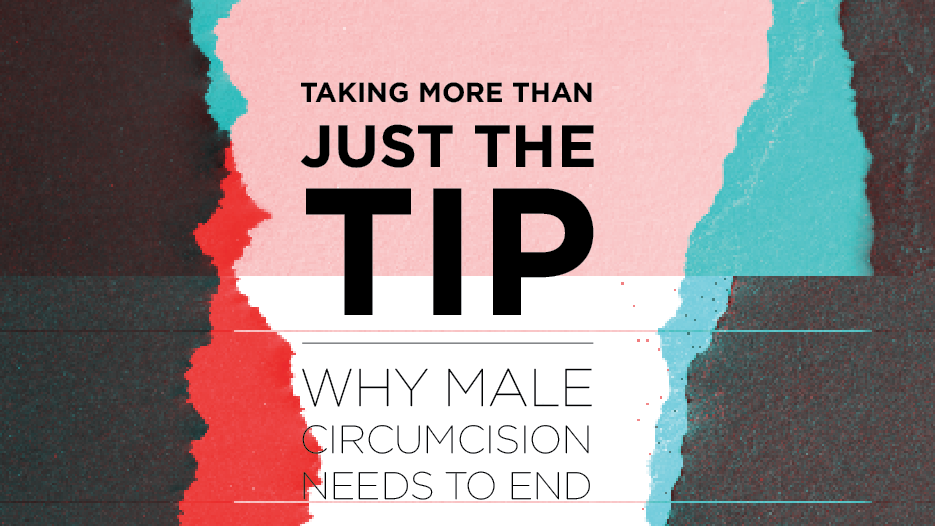Taking More than Just the Tip: Why Male Circumcision Needs to End
by Jake Krajewski | published Nov. 6th, 2015
When an American couple has a child, the issue of whether or not to circumcise is not usually debated. It is such a widely practiced and accepted procedure in the States that it hardly requires a second thought. But is cutting off that little flap of skin really something parents should be doing? Is it even something they have any right to do, if it is not medically necessary and not a part of their religion?
No, it isn't.
An extremely common double standard that simply blows my mind is how vehemently we abhor the female circumcision happening in other countries, while male circumcision is practically customary. In fact, we are one of the only countries in the world that routinely circumcises males for non-religious reasons. In fact, medical professionals from across the Atlantic have attacked previous attempts by the American Academy of Pediatrics to defend circumcision. Some European political groups even go so far as to call unnecessary, neonatal circumcision "child abuse."
Some argue that circumcision has health benefits. There are sources that claim that circumcised males are less likely to get urinary tract infections, a circumcised penis is easier to clean and circumcision helps prevent the spread of certain sexually transmitted diseases.
This is usually based around the idea that the foreskin provides an enclosed space for germs to multiply. However, considering that the United States is a first-world country with running water, this argument is null and void. Regular washing can clear out germs from under the foreskin the same way flossing clears out germs from the pockets between the gums and teeth. While some data does show that circumcised men tend to be less prone to diseases like HIV, the simple fact is that wearing a condom makes men, circumcised or not, nigh immune to the spread of the virus. Studies also show that circumcision reduces the chance of penile cancer, which only occurs in the foreskin,
So we know that getting circumcised has minimal health benefits, but are there really any drawbacks? Are there any reasons not to be circumcised? The answer is yes, there are several. Removal of the foreskin may be a common surgery, but it is still that: a surgery. Slicing off a fold of skin, no matter how commonly practiced, carries with it risks of infection and complications. Additionally, this procedure causes pain. Even if an anesthetic is administered during the surgery, the infant will still be in pain while he heals. Many animal rights groups say that de-clawing a kitten is inhumane because it is a painful, permanent procedure, so why are baby boys not protected when a similar situation plagues them?
However, perhaps the greatest reason not to circumcise does not come into question until the boy's teenage years. The foreskin plays a very important role in sex. On top of containing millions of nerve endings, the foreskin is designed to protect the glans of the penis from desensitization due to outside elements. It also acts a provider of natural lubricant and improves the overall sexual experience for the man.
This is a permanent procedure that is performed without consent.
If removing the foreskin is really so damaging, then why did we start performing the operation to begin with? In the United States, religions that promote circumcision — such as Judaism and Islam — aren't ubiquitous, so there must be another reason. Today, we circumcise because it's the standard, but circumcision began catching on in the early 1900s. In this time period, a societal trend of sexual fear was developing, with masturbation increasingly being seen as disgusting and as a source or symptom of mental illness. Propaganda encouraging the removal of the foreskin as a means of preventing masturbation began spreading as early as the 1870s. Medical articles from this time seem so overly in favor of circumcision that today they almost sound satirical. One article from this time calls the desire to masturbate an "octopus-like grip." This same article goes on to explain that circumcision removes the glans' protective shield, causing them to dry out and desensitize. More disturbing, however, is how enthusiastically the author expresses fondness of the procedure, stating that the foreskin makes up "a picture that is exceedingly tempting to the surgeon's scissors."
The bottom line, however, is that this is a permanent surgical procedure that is performed without consent. Unless the surgery is medically necessary in order to prevent a recurring urinary tract infection or another complication, it is morally and ethically questionable for parents to have their son circumcised as an infant. Even in cases of religious circumcision, it should be the child's choice whether or not they wish to be circumcised. The boy should be allowed to reach an age where he can make an informed decision about whether or not he wants to keep his foreskin. To make that decision without consulting him is incredibly insensitive to the child's right to control his body. Although some technology exists that can work over time to create a simulation of foreskin, it cannot replace all of the nervous tissue that has been removed.
If you have a son whom you plan on circumcising, I beg you to reconsider. You will be inflicting upon him a painful, irreversible procedure that will 



